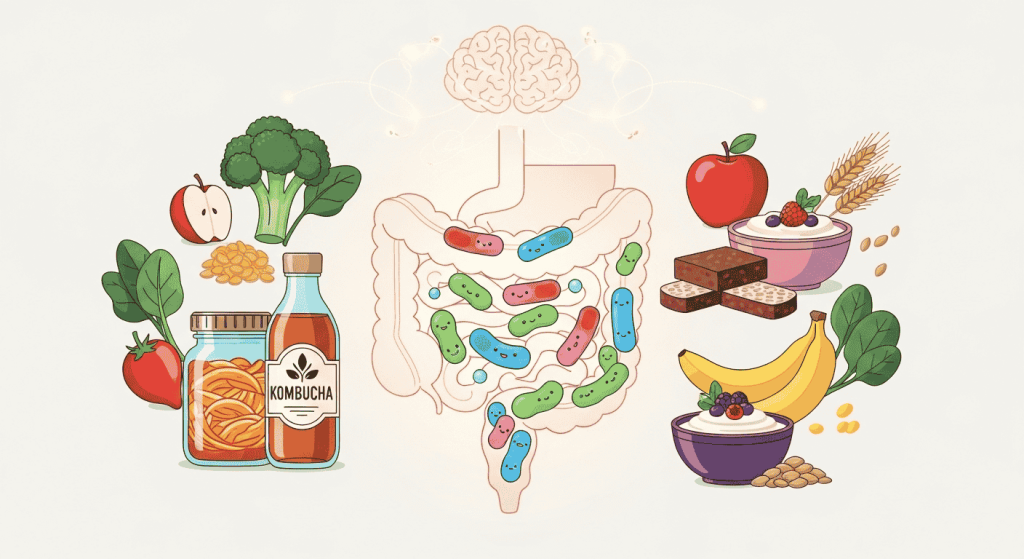Understanding your gut health isn’t just a trendy topic—it’s central to your overall well-being. Dive into this guide to learn how probiotics, prebiotics, and lifestyle choices work together to nourish your gut microbiome, boost digestive health, and support immunity and mental wellness.
What Is Gut Health and Why It Matters
Gut health refers to the well-being of your digestive system and the balance of microorganisms that live there. A healthy gut microbiome aids digestion, bolsters immunity, regulates metabolism, and even impacts mood and brain health.
Intermittent Fasting 101: Benefits and Tips
What Are Probiotics and Their Benefits
Probiotics are live bacteria and yeasts that help maintain or restore a balanced bacterial environment in your digestive tract. Common strains like Lactobacillus and Bifidobacterium appear in fermented foods and supplements.
Key Benefits of Probiotics:
Enhances digestive health by reducing bloating, constipation, gas, and IBS symptoms
Supports immune function and reduces inflammation
Promotes better nutrient absorption and metabolic balance
Contributes to skin health, easing conditions like acne and eczema for some
Supports the gut-brain axis, potentially reducing stress and enhancing mood
How Drinking Enough Water Can Transform Your Health
Prebiotics and Synbiotics: What They Do
Prebiotics are types of dietary fiber that feed good gut bacteria. Foods rich in prebiotics include garlic, onions, asparagus, bananas, oats, and chicory root.
Synbiotics combine prebiotics and probiotics to help beneficial bacteria flourish. While promising, this concept is still emerging and requires more clinical evidence.
Fermented Foods: Natural Probiotic Sources
Fermented foods offer practical, tasty ways to boost your probiotics. Popular gut-friendly options include:
Yogurt and kefir
Sauerkraut, kimchi
Miso, tempeh
Kombucha
These not only provide beneficial bacteria but also support digestion and immune health naturally.
5 Easy Healthy Breakfast Ideas for Busy Mornings
Simple Ways to Improve Gut Health Every Day
Diet & Lifestyle Tips:
Prioritize high-fiber foods—fruits, vegetables, legumes, and whole grains nourish gut bacteria.
Add probiotic-rich foods like yogurt, kefir, kimchi, and kombucha regularly.
Include prebiotic-rich ingredients—garlic, onions, asparagus, oats, bananas, chicory.
Stay hydrated to help fiber work effectively.
Manage stress, sleep well, and stay active—your gut pretty much mirrors your lifestyle.
Be skeptical of quick-fix trends—real gut health requires consistent habits, not viral fads.
Top 7 Anti-Inflammatory Foods That Fight Disease
Best Probiotic Supplements & How to Choose Them
If you use supplements, look for:
Multiple strains of beneficial bacteria
A CFU count of at least 10–50 billion
Survivability (e.g., enteric-coated capsules)
Reputable, clinically-tested brands—like Bioma, Culturelle, Align
Why Fiber is the Secret to a Healthy Gut
FAQ
1. What is the difference between probiotics and prebiotics?
Probiotics are live bacteria that benefit gut health, while prebiotics are fibers that feed those good bacteria.
2. Can I improve gut health through food alone?
Yes! Fermented and fiber-rich foods can support a healthy gut microbiome without supplements.
3. Are probiotics safe for everyone?
Generally yes, but people with weakened immune systems or severe health issues should consult a healthcare provider first.
Call to Action
Ready to take charge of your gut health with the right supplements and foods? Discover my top recommended products here:










